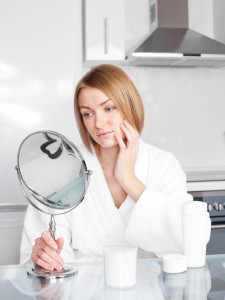June is National Acne Awareness Month!
According to the American Academy of Dermatology (AAD), acne is the most common skin condition in the United States. It can also be one of the toughest to treat. While there are a number of effective topical treatments on the market, as well as the option of oral antibiotics and vitamin-based supplements, acne can be stubborn and persistent in some cases.
Many people think that acne is just pimples ad will only appear on the face. However, acne can appear in a variety of lesions including; blackheads, whiteheads, pustules (what are often referred to as pimples), and pain cysts. Acne can also appear on other areas of the body including the beck, chest, neck, shoulders, upper arms, and buttocks.
There are many factors that contribute to acne. This can include heredity (did your mother or father have acne?), hormonal changes (such as puberty, menopause or pregnancy for women), dietary changes, stress, or changes in skin care products.
What if I don’t treat my acne? Will it just run its course?
This is one of the biggest myths surrounding acne. Acne does not just run its course. While it is a relatively benign skin condition, if left untreated it can create some unfortunate complications such as scarring and hyper-pigmentation. Studies also show that acne can lead to low self-esteem and depression as well.
“Doctor, what can I do for my acne?”
Acne is not exclusive to age groups or gender. In our practice we see women and men from ages 11 to 60+ with the same compliant. At any given time 40 to 50 million Americans have acne (souce:ADD).
There are many topical treatments for acne. Some help to visibly exfoliate dead skin cells preventing oil and bacteria from being trapped in the pore. Other topical treatments may contain antibiotics to combat the acne causing p.acne bacteria.
Oral antibiotics or other systemic medications are also an option in more sever cases.
Many patients in our practice opt for a “natural approach,” such as following a good skin care regimen designed for acne-prone skin and using an oral vitamin supplement. Regular acne facials to deep clean the skin and expunge any acne pus may also prove beneficial.
Patients that have tried topical treatments and oral antibiotics with no success find that laser treatment can often be the “silver bullet.” It is preferable for patients that have developed scarring or are at risk for scarring because the lasers stimulate collagen, which reduces the scars’ appearance. VBean PerfectaTM and SmoothbeamTM lasers used in combination can have fantastic results. The SmoothbeamTM is a collagen-stimulating laser that also shrinks hyperactive oil glands, reducing oil production. The VBeam PerfectaTM reduces inflammatory lesions and further stimulates collagen to diminish depressing scars and enlarged pores. The Fraxel® DUAL Laser can also be used to help with any residual scarring.
For more information about treatment for acne and acne scarring please contact our office at 858-350-SKIN (7546) or email us at [email protected]. A staff member can guide you through the scheduling process and help you get on the road to acne-free skin.


